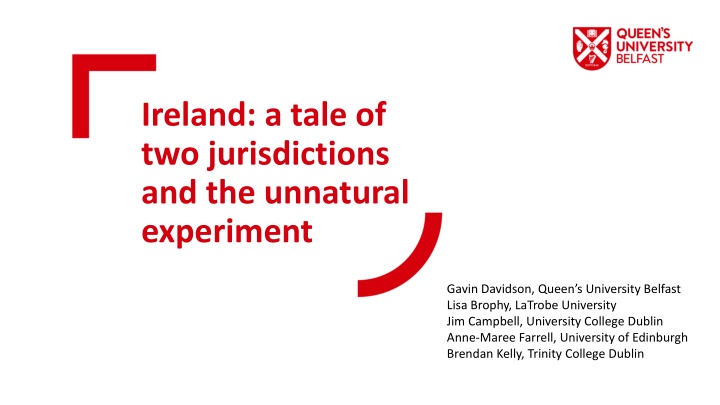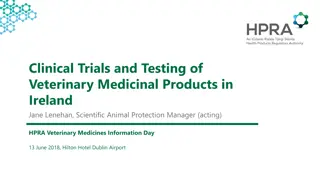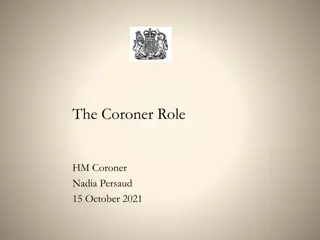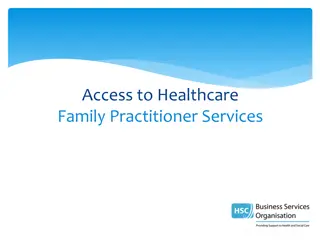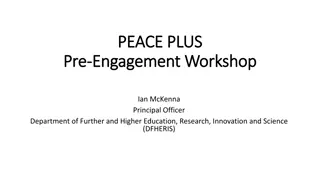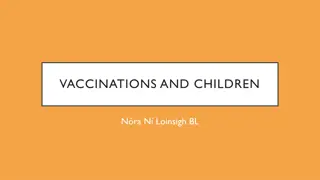A Tale of Two Jurisdictions: The Unnatural Experiment in Ireland
The presentation delves into the complex historical and political contexts of Ireland, highlighting key events such as the involvement of England, the formation of Northern Ireland, and the lasting impact of political conflict. It also examines the unique situation of separate laws, policies, and services between Northern Ireland and the Republic of Ireland, posing questions about potential natural experiments and the need for comparative research after a century of partition.
Download Presentation

Please find below an Image/Link to download the presentation.
The content on the website is provided AS IS for your information and personal use only. It may not be sold, licensed, or shared on other websites without obtaining consent from the author.If you encounter any issues during the download, it is possible that the publisher has removed the file from their server.
You are allowed to download the files provided on this website for personal or commercial use, subject to the condition that they are used lawfully. All files are the property of their respective owners.
The content on the website is provided AS IS for your information and personal use only. It may not be sold, licensed, or shared on other websites without obtaining consent from the author.
E N D
Presentation Transcript
Ireland: a tale of two jurisdictions and the unnatural experiment Gavin Davidson, Queen s University Belfast Lisa Brophy, LaTrobe University Jim Campbell, University College Dublin Anne-Maree Farrell, University of Edinburgh Brendan Kelly, Trinity College Dublin
Overview of the presentation Context of the island of Ireland North-South cooperation Law, policy and services Opportunities for alignment and comparison Possible next steps
Context of the island of Ireland Historical context 1169 England involved in ruling Ireland 1542 Crown of Ireland Act (Henry VIII) 1550s-1600s Plantation & rebellions 1690 Battle of the Boyne 1798 Uprising against British rule 1801 Union of Ireland Act abolished Irish Parliament 1916 Easter Rising 1920 Government of Ireland Act 1921 Northern Ireland formed
Context of the island of Ireland Political conflict 1968 Civil Rights Movement 1969 Increased violence & British Army involvement 1972 Bloody Sunday (13 unarmed protestors) 1974 33 killed by loyalist bombs in Monaghan & Dublin 1981 Hunger Strikers die 1984 Brighton bomb 1998 Good Friday Agreement 1969-2001 3,526 killed; 107,000 physically injured Ongoing high levels of trauma
Context of the island of Ireland Northern Ireland population 1.9 million Republic of Ireland population 7 million Separate laws, policies and services Opportunities for natural experiments? 100 years of partition and little comparative research
North-South cooperation Good Friday Agreement sought to build relationships: within Northern Ireland; between Northern Ireland and the Republic of Ireland; and between Britain and Ireland Strand 1 power-sharing Assembly and Executive that sometimes works Strand 2 North-South Ministerial Council and the North-South Implementation Bodies (Waterways, Food Safety, Trade) health is one of the six areas of co- operation (agriculture, education, environment, health, tourism, transport) Within health accident and emergency planning; major emergencies; technology; cancer; health promotion; child protection Strand 3 British-Irish Council and the British-Irish Intergovernmental Conference for reserved matters
North-South cooperation January 2020 Brexit from EU position of NI not yet resolved October 2020 Shared Island initiative Government of Ireland, Northern Ireland Executive and the British Government Further develop the all-island economy and North-South co-operation Range of research specific projects
Law, policy and services Farrell, A-M., Davidson, G., Donnelly, M., Agnew, E., Forbes, T. and Frowde, R. (2022) Mental health policies and laws on the island of Ireland. Edinburgh School of Law Research Paper Series. Working Paper was funded by the Wellcome Trust and ESRC Critical review of key policies, laws and institutional arrangements in the area of mental health in Northern Ireland and Ireland Aimed to map key similarities and differences between the two jurisdictions and inform possible joint research agenda in mental health policy and law Harder than we thought
Law, policy and services NI Mental Health (Northern Ireland) Order 1986 traditional mental disorder and risk approach RoI Mental Health Act 2001 similar framework NI Mental Capacity Act (Northern Ireland) 2016 partial implementation for DoL 2019, next phase IMCA 2023, civil 2024 and justice 2025 fusion approach RoI Assisted Decision-Making (Capacity) Act 2015 was scheduled to commence in June 2022 but has been delayed
Law, policy and services NI Department of Health (2020) Mental Health Strategy 2021-2031 RoI Department of Health (2020) Sharing the Vision: A Mental Health Policy for Everyone Both acknowledged the need for data on all aspects of mental health services some information available on inputs and activities, very limited routine data on needs or outcomes
Law, policy and services Structures and services Both predominately public funded services although greater reliance on private health insurance and charging in RoI and all free at the point of delivery in NI Health and social care integrated in both Mental Welfare Commission in RoI and Regulation and Quality Improvement Authority in NI Focus on numbers subject to compulsion and not routine data on experiences or outcomes
Opportunities for alignment and comparison In both jurisdictions there is the imminent implementation of new legal frameworks and a policy focus on outcomes NI Strategy Action 34 - Develop a regional Outcomes Framework in collaboration with service users and professionals, to underpin and drive service development and delivery . To ensure we have the right services that meet the needs of the population, we must have data to measure outcomes This will help in the evaluation of what works and will ensure services are provided that deliver good outcomes for people while providing value for money. (p. 87) Three rapid reviews for the Department of Health (NI) on international exemplars, the conceptual framework and the implementation process
HSE and the Department of Health (2022) Sharing the Vision implementation plan 2022-2024
What exemplars are available of international approaches to measuring mental health outcomes? Included exemplars from New Zealand, Australia, Scotland, Canada, Finland, France, Germany, Ireland, Sweden, Norway, UK and Organisation for Economic Cooperation and Development New Zealand - He Ara Oranga Wellbeing Outcomes Framework (Mental Health & Wellbeing Commission, 2021) comprehensive, principles based and clear process Co-define and identify existing models phase; develop the conceptual framework; identify how data can measure outcomes and data gaps Two Technical Advisory Groups Mental health and addiction; Population-level Australia need for routine outcome measurement included in Strategy since 1992 Finland - Mental Health Strategy and Programme for Suicide Prevention 2020-2030
What exemplars are available of international approaches to measuring mental health outcomes? Common themes The use of language is important, with a move away from a narrow focus on symptoms to including measuring wellbeing and quality of life Outcomes should reflect a holistic view of wellbeing (at an individual, family, community, population level) It is important to acknowledge the social, economic and environmental context of health and wellbeing Co-production is a central theme including identifying what people feel is important to measure It is useful to identify what data are already available and identify the data gaps so that only data that are needed and will be used are collected A limitation is that some frameworks are narrowly focused on clinical outcomes and do not provide information on context, inputs, processes or wider outcomes
Existing resources Current data Steering Group on Health Services Information chaired by Edith Korner Information technology is only exploited to the full when developments are information led, so that the information requirements must be identified first and only then a choice made from the wide range of technology available March 1982 Spreadsheet of outcome measures used in Trusts International Consortium for Health Outcomes Measurement (ICHOM) Core Outcome Measures in Effectiveness Trials (COMET) Initiative COnsensus-based Standards for the selection of health Measurement Instruments (COSMIN) Centre for Effective Services - Child, Youth and Family Database of standardised measurement tools used in Ireland and Northern Ireland NHS National Clinical Content Repository tools and measures library
What are the main issues to be considered in the development and implementation of mental health outcomes frameworks for Northern Ireland and RoI? Mental health outcomes data cannot be fully understood in isolation from the relevant prevalence, needs, demands, inputs and process data It is helpful to collect data in formats which can be compared within and between jurisdictions but also internationally It may also be helpful to consider whether it is mainly whole countries, or perhaps more probably, parts of other countries that provide a meaningful comparison Important to consider what data no longer needs to be collected and how existing processes could be amended Shouldn t prevent other more specific outcomes measures being used or developed but it s key that there should be an agreed regional set of measures which facilitates planning, evaluation and so can contribute to improving outcomes
Key messages from the rapid review for the implementation plan In most of the countries that have been reviewed, the focus tends to be on outcomes for those using public services and so a comprehensive overview and comparison between all relevant services is not possible which is a major limitation. There is an excellent opportunity to have an agreed approach to implementation across sectors. It also appears that the approach to outcomes at a population level and for those using mental health services is usually developed separately and so these do not align which again, produces major challenges for estimating need and tracking the relationship between the different levels of outcomes.
Key messages from the rapid review for the implementation plan Integration into an IT system that enables routine use of data/reports at different levels, including for individual service users and professionals is repeatedly identified as necessary to effective implementation. The challenges involved in achieving this are also acknowledged. It is also highlighted that the most effective approach to outcomes is when they can become a routine aspect of the assessment and review process and considered a useful tool rather than being viewed as a separate and additional task. The need to view the implementation of an outcomes framework as an ongoing process, which requires ongoing training, support and development, is incorporated into most implementation plans.
Possible next steps Agree the population indicators and resources data that provide the context Agree necessary activity/process data and stop the rest Identify small number of outcome measures to be used by all services (WEWBS or SDQ/KIDSCREEN + few single items (physical health, social functioning, quality of life; revised You in Mind) and service specific measures Management of change process Data analysis and reporting plan Leadership and established structures to be involved Training and ongoing support Include in pre and post qualifying training
Possible next steps Need for a specific and agreed approach to collecting data on the implementation of the new legal frameworks Activity data is already planned Departments of Health, MHC, RQIA, service users and carers should be central to the process Need to co-produce a shared approach to routinely collecting data about people s experiences and outcomes Ideal opportunity to explore the un/natural experiment
